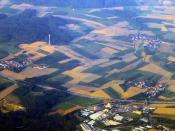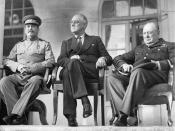Radar's Significance
During World War II
Andrew Simpson
250335535
History 020
Dr. Acres
July 23, 2007
�
The Allied forces use of radar during World War II can be considered one of the most important factors in helping to turn the tide of the war in favour of the Allies. Radar finds its origins decades before the outbreak of fighting the Second World War but the form with which it was used during the war stems from the work of Sir Robert Watson-Watt. His experimentation with radar was "just the first preliminary step in a long series of experiments before it would become Britain's shield." (Zimmerman 59) This development of radar technologies provided the advantage that the Allies direly needed in order to win World War II's battle of attrition. It provided necessary advantages in the aerial defense of Great Britain throughout the war, during the Allies strategic bombing campaigns of occupied Europe, and in naval engagements in the Pacific and Atlantic.
During the arms build up prior to the war the decision was made to create a series of radar towers along the British coast in order to provide early warning of an enemy attack. As war became imminent they were quickly technically improved so that by 1940 they could detect enemy aircraft 150 miles away. This defense system protecting Britain became known as the Chain Home Radar system. (Russell 137) This system would play a pivotal role in protecting Britain from the Luftwaffe in 1940 during the Battle of Britain. This was the name for the air war that occurred between the Royal Air Force and the Luftwaffe in the summer of 1940. Germany had planned an invasion of Britain and it was their belief that they would need air superiority in order to have the upper...


